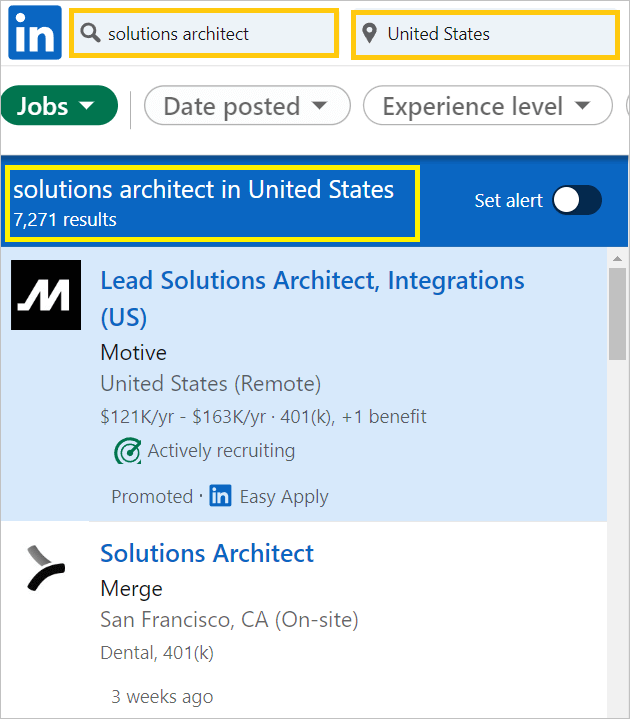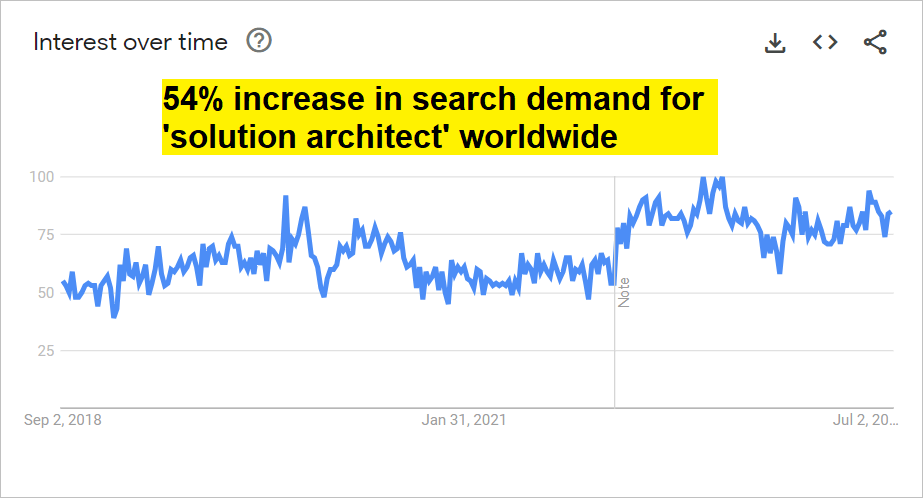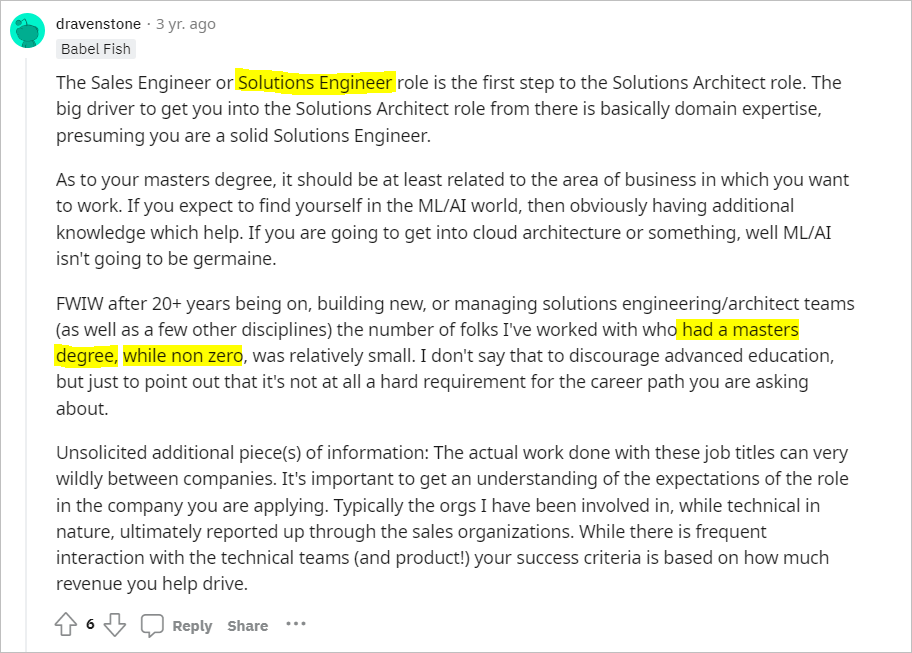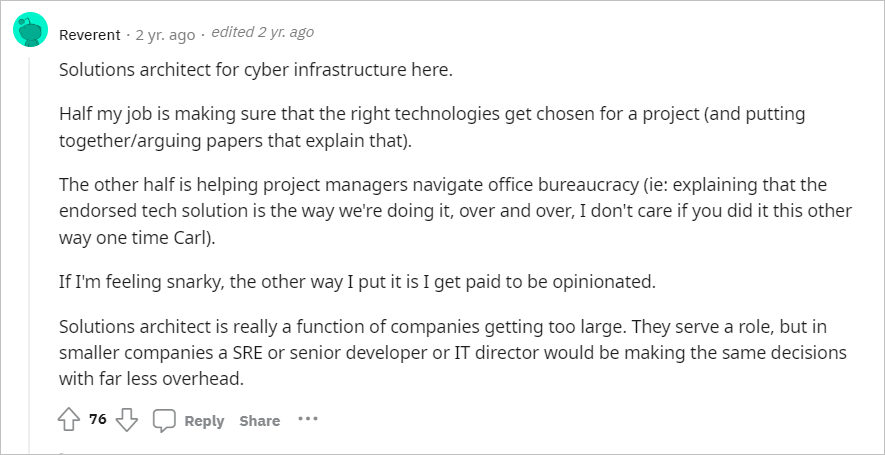If you’re looking to identify the career opportunities, job demands, and solution architect career path, this guide will help you.
In fact, we have answered some of the most important questions you might have regarding starting and growing your career as a solution architect in 2023.
Here’s what exactly you will learn:
Is solution architect a good career path in 2023?
Yes, solution architect is a good career choice for those with technical skills and a knack for designing and implementing complex systems to match business needs. When searching on LinkedIn, I found that there are over 7,000 jobs available for Solution Architects in the US, and 3,000+ jobs in India (as of Sep 2023)— which shows a strong market demand for qualified and skilled architects.

Some of the career Options for Solution architects are listed below:
- Enterprise architects
- Cloud architects
- Data architects
- Application architects
- Infrastructure architects
- Security architects
Also, to understand the worldwide demand, I checked Google Trends which suggests that the search demand for solutions architects’ has increased by around 54% in the last five years.

As in step with industry reviews, the call for Solution Architects surged by over 4% in the last 5 years. AI tools will primarily support software engineers instead of fully replacing them.
While certain repetitive tasks can be automated, the human element and creative thinking remain essential.
What is a Solution Architect?
A Solution Architect is an expert answerable for designing and overseeing the implementation of complicated software packages or structures. They bridge the gap between commercial enterprise wishes and technical solutions by way of reading requirements, developing architectural designs, and guiding development groups.
Software architecture plays an important part in IT fields such as software development, cloud computing, and enterprise architecture contexts.
With a mix of technical know-how and enterprise acumen, they ensure that technology solutions correctly cope with specific organizational goals.
What do Solutions Architects do?
Solutions Architects work with agencies to apprehend their desires and then design and describe the great approaches to using technology to meet one’s wishes.
They create plans that show how software programs, hardware, and structures can be painted collectively and successfully. It’s like building a puzzle of technology to help businesses prevail.
Day-to-Day Tasks:
- Customized Solutions: They design tailor-made era answers for corporations.
- Listening and Planning: They apprehend enterprise needs and plan how software programs and systems will work collectively.
- Integration: They arrange exclusive technology pieces to create green structures, much like assembling a puzzle.
- Considerations: They aspect in protection, pace, fee, and different vital components.
- Problem Solvers: They solve demanding situations to ensure all parts communicate well and meet goals.
- Guidance: They manual groups in the course of implementation, making sure anyone is on the identical web page.
- Harmonious Results: Similar to conductors, they ensure all parts work in harmony, leading to dependable and efficient systems.
- Business Growth: Their designs help organizations run easily, scale, and acquire their goals.
Solution Architect Career Paths in 2023
1. Cloud Integration Specialist
A Cloud Integration Specialist is a skilled professional responsible for seamlessly connecting various cloud-based and on-premises systems within an organization. They design, implement, and manage integration solutions that ensure smooth data flow and communication across platforms.
By ensuring efficient interoperability, these specialists enhance operational efficiency, data accuracy, and overall business agility.
Role Type: Mid-level (who has immense knowledge about Cloud Integration)
Years of experience required: 5 – 7 years
Average Annual Salary: ₹13 Lakhs in India and $128,447 in the US.
Job Requirements:
- Designing scalable cloud and hybrid architectures.
- Collaborating with stakeholders to acquire necessities and recognize technical desires.
- Selecting appropriate cloud services and technologies for best performance and cost efficiency.
- Integrating on-premises and cloud resources for seamless record flow and functionality.
- Implementing sturdy safety features to protect statistics and ensure compliance.
Key Skills Required:
- Proficiency in leveraging cloud systems for scalable and flexible answers.
- Ability to layout systems that speak seamlessly across numerous components.
- Skill in implementing robust safety features to guard statistics and structures.
- Capacity to create cohesive and efficient architectural systems.
- Proficiency in programming languages to personalize solutions correctly.
- Aptitude to creatively navigate challenges and devise powerful solutions.
- Strong talents in conveying complicated ideas virtually to diverse audiences.
2. Junior Associate Roles
Junior Associate roles involve providing essential support, learning from experienced team members, and contributing to various tasks within an organization. They contribute to team growth and daily operations.
Years of Experience Required : 0-2 Years
Role Type: Entry-level or Fresher
Average Annual Salary: ₹15,000 to ₹5,03,024 in India and $50,000-85,000 in the US.
Job Responsibilities:
- Assisting senior architects in designing cloud and hybrid solutions.
- Participating in requirements and evaluation.
- Supporting the combination of on-premises and cloud sources.
- Monitoring machine overall performance and identifying fundamental issues.
- Documenting structure designs and choices.
- Collaborating with group contributors to make contributions to initiatives.
- Providing technical help and troubleshooting.
Key Skills Required:
- Basic understanding of cloud computing ideas and technologies.
- Familiarity with programming languages like Python, Java, or JavaScript.
- Strong problem-solving and analytical abilities.
- Effective verbal exchange for taking part with team participants.
- Eagerness to examine and adapt to new technology.
3. Edge Computing and IoT Role
Edge Computing and IoT Architects layout and enforce solutions that leverage aspect computing and the Internet of Things (IoT) technology.
Role Type: Senior-level and who has advanced knowledge in Edge Computing
Years of Experience Required: 6 – 7 years
Average Annual Salary: ₹4 lakhs to ₹46 lakhs in India and $53,000 to $67000 in the US.
Job Responsibilities:
- Designing facet computing architectures that integrate IoT devices and sensors.
- Identifying the right devices and hardware for records processing.
- Developing strategies for efficient statistics transmission among areas and important structures.
- Implementing security measures for aspect devices and records in transit.
- Collaborating with data scientists to enhance analytical models for real-time insights.
Key Skills Required:
- Proficiency in side computing technology and architectures.
- Knowledge of sensors, actuators, and embedded structures.
- Expertise in fact processing, analytics, and gadgets gaining knowledge at the edge.
- Understanding of cybersecurity for securing facet devices and data.
- Communication talents for taking part with move-practical teams.
4. Serverless Architecture Role
Serverless Architecture Engineers focus on designing and implementing programs and the usage of serverless computing frameworks.
Role Type: Mid-level (who knows serverless architecture)
Years of Experience: 5 – 6 years
Average Annual Salary: ₹2.8 lakhs to ₹27 lakhs in India and $122,136 in the US.
Job Responsibilities:
- Designing serverless software architectures aligned with business targets.
- Developing, deploying, and preserving serverless capabilities on structures like AWS Lambda, Azure Functions, or Google Cloud Functions.
- Optimizing code for green useful resource utilization and minimum latency.
- Implementing occasion-pushed and microservices-based layout styles.
- Integrating serverless components with other offerings and APIs seamlessly.
Key Skills Required:
- Proficiency in serverless computing structures including AWS Lambda, Azure Functions, or Google Cloud Functions.
- Strong programming abilities, such as languages like Python, Node.Js, or Java.
- In-intensity know-how of event-pushed structure and microservices concepts.
- Familiarity with APIs, RESTful services, and cloud-native development concepts.
- Experience with deployment tools, CI/CD pipelines, and version management.
- Problem-solving flair for optimizing code performance and performance.
5. Sustainability and Green IT Role
Sustainability and Green IT play critical roles in cutting-edge tech panorama. They are awareness on green practices, reducing energy intake, minimizing electronic waste, and promoting environmentally conscious techniques for a greener, extra sustainable destiny.
Role Type: Mid-level and who knows how to optimize the use of resources
Years of Experience: 6 – 7 years
Average Annual Salary: ₹20 lakhs in India and $69,3893 in the US.
Job Responsibilities:
- Designing strength-green IT infrastructures and structures.
- Evaluating hardware and software solutions for his or her environmental effect.
- Recommending and imposing strategies to optimize electricity utilization in data centres.
- Collaborating with groups to broaden green software development practices.Implementing virtualization and cloud technologies to improve useful resource performance.
- Communicating and selling sustainability projects inside the employer.
Key Skills Required:
- In-depth expertise in inexperienced IT standards and sustainable generation practices.
- Familiarity with power-efficient hardware, software, and information center design.
- Proficiency in virtualization, cloud computing, and electricity-efficient networking.
- Strong analytical talents for assessing environmental influences of technology answers.
- Understanding of applicable environmental rules and compliance requirements.
6. MultiCloud Strategy Role
MultiCloud Strategy Architects are responsible for designing and implementing techniques that leverage a couple of cloud platforms to optimize performance, redundancy, and value effectiveness.
Role Type: Mid-Level or who is good at handling multi-cloud
Years of Experience: 4 – 5 years
Average Annual Salary: ₹8 lakhs to 18 lakhs in India and $132K – $227K in the US.
Job Responsibilities:
- Designing architectures that permit applications to run throughout multiple cloud carriers.
- Evaluating the strengths and weaknesses of different cloud platforms.
- Developing techniques to avoid dealer lock-in and ensure enterprise continuity.
- Implementing solutions for data synchronization and easy migration among clouds.
- Ensuring security and compliance across a couple of cloud environments.
- Collaborating with groups to manipulate sources and expenses effectively.
- Monitoring and optimizing performance throughout various cloud platforms.
Key Skills Required:
- Proficiency in multiple cloud structures (e.g. AWS, Azure, Google Cloud).
- Strong knowledge of cloud architecture and offerings.
- Knowledge of cloud migration strategies and hybrid cloud integration.
- Security know-how to enforce cross-cloud security measures.
- Experience with cloud value control and optimization.
- Interoperability talents to combine diverse cloud services.
- Communication abilities for explaining multi-cloud strategies to stakeholders.
- Problem-fixing flair for addressing demanding situations in multi-cloud environments.
Relevant: Check out free software engineering courses available online.
Job Outlook for Solutions Architects
The activity outlook for Solutions Architects is incredibly promising because of the escalating demand for technology-driven solutions. With organizations embracing virtual transformation and the advent of cloud computing and IoT, their function is essential for aligning complex systems with strategic dreams.
Across industries, from healthcare to finance, skilled Solutions Architects are sought-after belongings, ensuring a dynamic and profitable career route beforehand.
The average earnings of Solutions Architects can vary depending on the country they paint in.
For example:
In India, the average salary for a Solutions Architect is typically around ₹25 lakhs to ₹46 lakhs per year, although this can be higher in big cities and with more experience.
On the other hand, In the United States, the average salary for a Solutions Architect is a little more, ranging from $142K to $365K annually.
The above data suggests a substantial income range difference for Solutions Architects, with the US offering slightly higher average salaries compared to India, driven by factors such as experience and location.
Skills and Prerequisites to become a solutions architect
The skills required to become a Solutions Architect in 2023 are as follows:
1. Technical Proficiency: Stronghold close of cloud concepts and offerings, which include IaaS, PaaS, and SaaS. Proficiency in at least one major cloud platform like AWS, Azure, or Google Cloud.
2. Architecture Design: It includes Scalability, Reliability, and Performance, where we design structures to ensure excessive availability and fault tolerance.
3. Problem-Solving: The position of a Solutions Architect closely relies on their adept trouble-solving capabilities. They appoint these talents to analyze complex challenges, layout innovative solutions, and make sure alignment with business objectives and technical requirements.
4. Communication: Communication is a critical trait for Solutions Architects, similar to professional translators who bridge the distance between technical jargon and plain language. They convey complex generation ideas to various audiences, allowing powerful collaboration amongst groups, stakeholders, and customers.
5. Project Management: Solutions Architects play a crucial role in project management, like experienced captains leading complex technology journeys. They manage the entire architectural process, from start to finish, by coordinating teams, schedules, and resources.
6. Collaboration: Collaboration is a cornerstone of Solutions Architects’ paintings, comparable to professional conductors orchestrating a symphony of expertise from numerous groups.
7. Business Acumen: Business acumen is a key characteristic of Solutions Architects, just like astute navigators who recognize the terrain in which generation operates.
8. Familiarity with programming languages, cloud platforms, and certifications like AWS Certified Solutions Architect can enhance credibility.
9. Strong problem-solving skills, powerful communication, and the potential to collaborate within past-practical teams are crucial for fulfillment in this role.
The Future of Solutions Architect – Will AI Replace Solutions Architects?
While artificial intelligence (AI) indicates promise in automating ordinary obligations and aiding decision-making, it is not going to update solutions architects entirely.
These architects manage intricate selections, considering factors like enterprise context, innovation, and moral concerns, which require human judgment. They bridge the era with enterprise desires, which entails strategic questioning AI lacks.
Architects also carry the creativity, adaptability, and conversation abilities that AI hasn’t replicated.
AI assists in processing data and suggesting solutions, but human architects excel in the human-centric, innovative, and strategic aspects of design.
AI may enhance their work, but the complexities of architecture suggest that human involvement will remain vital in creating effective and innovative solutions.
Solutions Architect salary
In India, the average compensation for Solution Architects varies, with the following ranges:
- Entry-level Solution Architects earn around ₹20L to ₹35L per year.
- Mid-level Solution Architects can make between ₹2,00,000 – ₹4,75,000 yearly.
- Senior Solution Architects with significant experience can earn up to ₹28,00,000 yearly.
Comparatively, in the USA, Solution Architects command higher salaries (according to Glassdoor):
- Entry-level Solution Architects make around $176K – $292K/yr annually.
- Mid-level Solution Architects can earn between $178K – $278K /yr per year.
- Senior-level Solution Architects with extensive expertise can earn around $194K – $316K /yr.
Factors that affect the salary
Here are the important factors that affect the earnings of Solutions Architects:
- Experience: More enjoyment leads to better pay.
- Location: Salaries may be better in huge towns and tech-centered regions.
- Company Size and Type: Bigger businesses or complicated projects can provide better pay.
- Skills and Specialties: Rare or in-demand capabilities can mean better salaries.
- Education: Higher stages can cause better pay.
- Demand: High demand for his or her abilities can increase pay.
- Responsibilities: More critical roles or duties can result in better salaries.
How difficult is becoming a solution architect?
Being a Solutions Architect is a piece like solving hard puzzles. Imagine you have a huge field of poser pieces, and your task is to position them collectively to make a lovely photograph. You need to think about how every piece fits and what the final image needs to seem like.
Similarly, a Solutions Architect needs to understand how special PC parts and programs work collectively. They lay out systems that assist agencies to run smoothly. Sometimes, this will be problematic because they ought to consider many things right away, like protection, speed, and making sure the whole thing is simple for humans to use.
They look at and practice to get better at fixing those tech puzzles. So, whilst it can be difficult, to gain knowledge of and exercise, they could end up, in reality, correct at making the whole lot fit collectively simply properly.
Solution architect career path Reddit— what others are saying on Reddit?
If you’re looking for opinions from other solution architects about the career path, then you might consider checking out what other Reddit users (tech lovers) are saying.
I’ve checked some of the top subreddits to find expert insights on this.
Here are some of the insightful opinions from Reddit users:

Draven Stone makes an insightful commentary on the career progression from sales engineer or solutions engineer to the role of solutions architect. He highlights that the key driver for advancing to a Solutions Architect role is domain expertise, assuming you have a solid foundation as a Solutions Engineer.
Regarding the relevance of a master’s degree, Draven wisely suggests that it should be related to your desired business area. For instance, if you aspire to work in the ML/AI domain, additional knowledge in that field would be beneficial.
This insight underscores the practical nature of these positions, where real-world problem-solving and technical acumen often overshadow formal academic qualifications.
Another insightful comment by Reverent in response to the question ‘What do your solutions architects do?’:
Reverent highlights two essential aspects of the job: technology selection and navigating organizational bureaucracy. This dual responsibility underscores the multifaceted nature of the position, where technical expertise and interpersonal skills are equally critical.

Is the solution architect career path a right fit for you?
If you are confused about whether solutions architect will be the right career path for you or not, take this quick quiz and get a data-based answer.
Question 1: How do you feel about designing complex technical solutions?
A) Excited and enjoy it (3 points)
B) Willing, but not excited (2 points)
C) Prefer other aspects (1 point)
Question 2: How do you handle balancing business and technical requirements?
A) Excel at bridging the gap (3 points)
B) Can manage but find it challenging (2 points)
C) Struggle to align them (1 point)
Question 3: How do you manage working on multiple projects simultaneously?
A) Thrive and manage efficiently (3 points)
B) Can handle but prefer one at a time (2 points)
C) Find it difficult to juggle effectively (1 point)
Question 4: How comfortable are you with programming and scripting languages commonly used in solution architecture, such as Java, Python, or JavaScript?
A) Very comfortable and proficient (3 points)
B) Comfortable, but not proficient (2 points)
C) Not comfortable at all (1 point)
Question 5: Have you worked with cloud computing platforms and services (e.g., AWS, Azure, GCP)?
A) Yes, extensively (3 points)
B) Yes, but only to a limited extent (2 points)
C) No experience with cloud platforms (1 point)
Question 6: Are you familiar with key architectural patterns and principles (e.g., microservices, SOA, REST)?
A) Very familiar and can apply them effectively (3 points)
B) Somewhat familiar but need more experience (2 points)
C) Not familiar with these concepts (1 point)
Question 7: How do you handle learning and adapting to new technologies and tools in the fast-evolving tech landscape?
A) Enthusiastically embrace new technologies (3 points)
B) Willing to learn, but find it challenging (2 points)
C) Prefer to stick with what I know (1 point)
Once you’ve answered the above questions, calculate your total points. Next, refer to the following interpretation to understand whether this is the right career fit for you.
- 16-21 points: Strong fit for a solution architect career with enthusiasm and technical skills.
- 11-15 points: Potential fit, but consider building more technical skills and adaptability.
- 7-10 points: Explore other tech career paths that align better with your skills and interests.
NOTE:
This process is not the most effective way to decide your career. However, you will get a quick understanding of your interests and current skills.
If you’re looking for a career alternative, you may consider the software engineering career path by reading this guide.
Solution architect course certifications to start your career
The following solution architect courses will help you improve your skills and become ready for high-paying jobs:
1. AWS Certified Solutions Architect ($150): Associate certification is a valuable credential for those with experience in AWS technology, offering expertise in design, deployment, and management of AWS solutions. This certification doesn’t require deep coding skills but focuses on the AWS Well-Architected Framework.
2. Microsoft Certified: Azure Solutions Architect ($165 USD): Azure Solutions Architect Expert certification is designed for experts in Azure, emphasizing cloud and hybrid solution design across in various domains, including computing, network, storage, monitoring, and security. The certification costs $165 USD and includes various language options for the exam. Renewal and support resources are available to candidates.
3. AWS Certified Solutions Architect Associate 2023 (Free YouTube course): This AWS cloud computing course is your key to AWS solution architect certification success and building a rewarding cloud architect career.
4. AWS Cloud Specialization by Coursera (Free): This course series provides insights into cloud computing roles, evaluates necessary skills, and explores the application of cloud expertise, particularly in AWS, for effective solutions. It covers fundamentals, introduces cloud computing roles, and offers hands-on experience.
5. How to Become a Cloud Architect (Free): This free online course provides insights into becoming a cloud architect, outlining their roles, skills, career paths, and training options.

Article by
Mouri Roy
Mouri Roy is a dedicated Software Developer and a fervent Technical Content Writer, currently in pursuit of her B-Tech in Computer Science and Engineering at Techno Main Salt Lake. Her expertise includes Java, ReactJs, NodeJs, ExpressJs, MongoDB, SQL, HTML, CSS, JavaScript, and Bootstrap, making her a versatile and sought-after developer.

